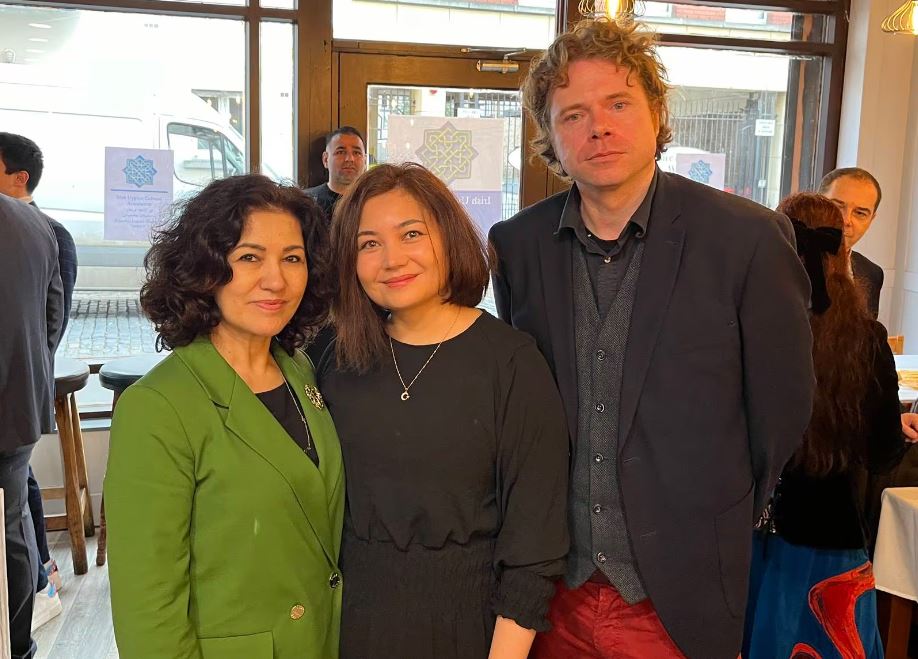Rushan Abbas, Nuria Zyden, and David O’Brien, at the launch of the Uyghur Irish Cultural Association in Dublin on Friday
The Irish Times, Jan 26 2024
‘I came to Ireland but still I was living with fear. I never could say what I was really experiencing’, says co-founder Nuria Zyden
Living in Ireland for the past decade and a half, Nuria Zyden, an Irish citizen and member of the small Irish Uyghur community, has been fearful of speaking publicly about the Chinese government’s campaign of oppression in Xinjiang.
“I came to Ireland but still I was living with fear. I never could say what I was really experiencing, what was happening to me,” she says.
Zyden, along with Irish academic David O’Brien, who specialises in ethnic identity in China, has cofounded the Irish Uyghur Cutural Association. It will focus on Uyghur culture and language, but also seek to raise awareness about what is happening to the Uyghur people in China.
The new association was launched at a celebration of Uyghur culture in a Dublin restaurant on Friday, attended by members of the community, many of them in traditional dress.
The event featured Uyghur music and poetry, with food and cakes brought along by the attendees.
Among those at the launch were Dolkun Isa, president of the World Uyghur Congress, Rushan Abbas, executive director of the US-based Campaign for Uyghurs, her husband, Abdulhakin Idris, executive director of the US Centre for Uyghur Studies, Pierre Yang, Taiwan’s representative to Ireland, Oliver Sears, of Holocaust Awareness Ireland, representatives of the Muslim community in Ireland, Irish supporters of the Uyghur movement and representatives of the US embassy.
Speaking before the launch, Zyden said that since her late teens she has been an admirer of the European tradition of free speech, which does not exist in China.
When she ended up living in Ireland, and became an Irish citizen, she found herself still fearful of speaking her mind about the oppression of the Uyghur community in China, something that the United Nations Office of the High Commissioner on Human Rights (UNHCHR) has said may constitute a crime against humanity.
“Recently I was thinking, life is short, and we should uphold our true values. If I believe what they are doing is wrong, I shouldn’t still be hypocritical and say everything is fine,” she said.
She feels strongly that it is “not fair” she should continue to feel controlled by the regime in Beijing while living in a country that recognises free speech, even if speaking out involves the risk of repercussions.
“We can’t be that selfish, just thinking about our safety, ourselves. We need to care about our fellow human beings, especially if something is happening to our own people, our own nation, our sister, brother. If I am still being quiet, still being controlled by their system, I feel it is not worth it. I am not upholding what I believe.”
While the situation of the mostly Muslim Uyghur people in the Xinjiang province of China is currently one of misery “in history we had a glamour, we had a heritage, we had beautiful music, art, the Silk Road. It is important to keep that culture. Every culture deserves to be celebrated and passed on through the generations”.
At a talk in Dublin City University on Thursday, Abbas said the campaign against the Uyghur and other Turkic people in Xinjiang involves concentration camps, cutting edge surveillance technology, forced sterilisations and abortions, mass rape, organ harvesting, child abduction, and modern-day slavery.
Xinjiang, which translates as New Territory, was incorporated into the People’s Republic of China in 1949. Many Turkic people from the province prefer to call it East Turkistan. Han Chinese, the majority ethnic group in China, who accounted for 7 per cent of the population of Xinjiang in the early 1950s, now comprise 42 per cent of its 26 million population.
In a statement last year, the Chinese embassy in Dublin said the authorities in Xinjiang are taking “resolute measures” to combat “extremism” there, in full accordance with Chinese law. “All ethnic groups of the People’s Republic of China enjoy equality,” it said. Claims of slave labour were “a big lie” made by “anti-China forces”.
Colm Keena
Colm Keena is an Irish Times journalist. He was previously legal-affairs correspondent and public-affairs correspondent

